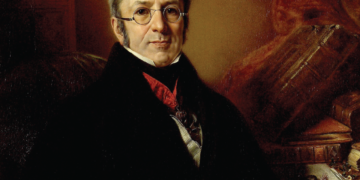Jonathan Edwards
1) His Biography
Jonathan Edwards was born on October 5, 1703, in East Windsor, Connecticut, into a devout and scholarly family. His father, Timothy Edwards, was a minister and his mother, Esther Stoddard, was the daughter of Solomon Stoddard, a prominent preacher in Northampton, Massachusetts. This rich spiritual and intellectual environment deeply influenced Edwards from a young age, fostering his precocious intellect and religious fervour. By the age of 13, Edwards entered Yale College, an impressive feat that underscored his extraordinary academic abilities. His early education at Yale laid the foundation for his later theological and philosophical pursuits.
Edwards graduated from Yale in 1720 as the valedictorian of his class, demonstrating exceptional proficiency in theology and philosophy. After a brief stint studying theology, he was appointed as a tutor at Yale, a position he held from 1724 to 1726. During this time, Edwards immersed himself in the works of John Locke and Isaac Newton, whose writings on empiricism and natural philosophy left a lasting impression on him. This intellectual engagement helped Edwards develop a unique theological perspective that blended Reformed theology with Enlightenment thought.
In 1727, Edwards was ordained and became an assistant pastor to his grandfather, Solomon Stoddard, in Northampton, Massachusetts. Following Stoddard’s death in 1729, Edwards succeeded him as the full-time pastor. His sermons during this period were characterised by an emphasis on the sovereignty of God, the depravity of humanity, and the necessity of a personal religious experience. Edwards’ preaching style, which was both intellectually rigorous and emotionally stirring, began to attract considerable attention, setting the stage for his pivotal role in the Great Awakening.
The Great Awakening, a series of religious revivals that swept through the American colonies in the 1730s and 1740s, marked a significant chapter in Edwards’ life. His most famous sermon, “Sinners in the Hands of an Angry God,” delivered in 1741, epitomised the intense emotional and spiritual fervour of this movement. The sermon vividly depicted the torments of hell and the wrath of God, aiming to awaken his congregation to the reality of their spiritual peril. This and other sermons by Edwards helped catalyse a widespread religious revival, significantly impacting American Protestantism.
Despite his successes, Edwards’ tenure in Northampton was not without controversy. His stringent views on church membership and communion practices eventually led to a conflict with his congregation. In 1750, after a particularly contentious debate over the Half-Way Covenant, which allowed for a broader inclusion of church members, Edwards was dismissed from his position. This event marked a turning point in his career, leading him to a quieter but still intellectually productive period of his life.
Following his dismissal, Edwards moved to the frontier town of Stockbridge, Massachusetts, where he served as a missionary to the Housatonic Indians and as a pastor to a small congregation of settlers. During his time in Stockbridge, Edwards continued to write prolifically, producing some of his most important works, including “Freedom of the Will” (1754) and “The Great Christian Doctrine of Original Sin Defended” (1758). These writings further developed his theological ideas and cemented his reputation as one of the leading theologians of his time.
In 1758, Edwards was invited to become the president of the College of New Jersey (now Princeton University). Unfortunately, his tenure was cut short by his untimely death on March 22, 1758, from complications following a smallpox inoculation. Despite his relatively brief life, Edwards left an enduring legacy through his sermons, writings, and the profound influence he had on American religious thought. His integration of rigorous intellectual inquiry with deep religious conviction continues to be studied and admired by theologians, historians, and philosophers to this day.
2) Main Works
A Faithful Narrative of the Surprising Work of God (1737):
This work is one of Jonathan Edwards’ earliest and most influential publications. It details the religious revival that took place in Northampton, Massachusetts, during the early 1730s, which Edwards himself spearheaded. The narrative describes the intense religious experiences and conversions that occurred, providing a vivid account of the spiritual awakening that swept through the town. Edwards’ meticulous documentation of these events not only highlights the fervour and emotional intensity of the revival but also aims to present it as a genuine work of God. This text was instrumental in spreading news of the revival and encouraging similar movements across the American colonies and Great Britain, thereby playing a key role in the larger context of the Great Awakening.
Sinners in the Hands of an Angry God (1741):
Perhaps Edwards’ most famous sermon, “Sinners in the Hands of an Angry God,” epitomises the fire-and-brimstone preaching style of the Great Awakening. Delivered in Enfield, Connecticut, this sermon starkly portrays the precariousness of human existence and the imminent danger of divine wrath. Edwards uses vivid and terrifying imagery to convey the idea that sinners are always on the brink of eternal damnation, held over the flames of hell solely by the grace of God. The sermon was intended to awaken his listeners to the dire need for repentance and conversion. Its powerful and evocative language has made it one of the most enduring and studied pieces of American religious literature.
A Treatise Concerning Religious Affections (1746):
In this comprehensive work, Edwards explores the nature of true religious experience and the distinguishing marks of genuine Christian piety. “A Treatise Concerning Religious Affections” delves into the psychological and emotional aspects of faith, arguing that authentic religious experiences are marked by deep, heartfelt affections rather than mere intellectual assent or outward observance. Edwards categorises these affections and examines their origins, manifestations, and effects. This treatise is significant for its rigorous analysis of the emotional components of religious life, offering insights into the complex interplay between emotion, belief, and behaviour in the context of Christian faith.
Freedom of the Will (1754):
In “Freedom of the Will,” Edwards tackles one of the most profound philosophical and theological issues: the nature of human free will and its compatibility with divine sovereignty. Edwards argues against the notion of libertarian free will, asserting that human choices are determined by the strongest motives or inclinations at the moment of decision. He posits that true freedom is not the ability to choose otherwise but to act according to one’s nature and desires. This work is a cornerstone of Reformed theology, defending the doctrines of original sin and predestination while engaging with Enlightenment ideas about human agency and moral responsibility. Its influence extends beyond theology into the realms of philosophy and psychology.
The Great Christian Doctrine of Original Sin Defended (1758):
In this significant theological treatise, Edwards provides a robust defence of the doctrine of original sin against contemporary critics who challenged its validity and moral implications. Drawing on scriptural evidence, theological reasoning, and philosophical arguments, Edwards contends that humanity’s fallen state is a fundamental aspect of Christian doctrine. He argues that the inherent sinfulness and moral corruption of human nature necessitate divine grace for salvation. This work is essential for understanding Edwards’ views on human nature, sin, and redemption. It also reflects his broader intellectual engagement with the theological controversies of his time and his commitment to upholding orthodox Christian beliefs in the face of emerging rationalist critiques.
3) Main Themes
The Sovereignty of God:
Edwards strongly emphasised God’s absolute sovereignty over all creation. He argued that every event, no matter how seemingly insignificant, is part of God’s divine plan. This belief contrasts with the views of Arminian theologians, who emphasised human free will and its role in salvation. Edwards’ understanding of sovereignty was deeply rooted in Reformed theology, particularly Calvinism, which asserts God’s meticulous governance over the universe.
Edwards uniquely integrated Enlightenment thought with traditional Reformed theology. By engaging with the works of philosophers like John Locke and Isaac Newton, he articulated a view of divine sovereignty that accommodated contemporary scientific and philosophical developments. This synthesis made his theological perspective more palatable and relevant to his contemporaries.
Unlike Enlightenment thinkers such as Voltaire, who championed human reason and often downplayed divine intervention, Edwards maintained that God’s sovereignty was compatible with human rationality. He used the language of causality and natural law, common in Enlightenment discourse, to describe God’s governance, thereby bridging the gap between traditional Christian doctrine and modern intellectual currents.
The Depravity of Human Nature:
Edwards staunchly defended the doctrine of original sin, positing that humanity is inherently sinful due to Adam’s fall. He argued that this depravity affects every aspect of human existence, necessitating divine intervention for salvation. This view was a direct rebuttal to the more optimistic assessments of human nature by Enlightenment thinkers such as Jean-Jacques Rousseau, who believed in the inherent goodness of man.
Edwards explored the moral and psychological dimensions of human depravity. He contended that the will is enslaved by sinful inclinations, making genuine moral transformation impossible without God’s grace. This perspective provided a rigorous framework for understanding the pervasive influence of sin on human behaviour and motivation.
Unlike Augustine, who also emphasised original sin, Edwards delved deeply into the affective and experiential aspects of sinfulness. His detailed analysis of religious affections provided a nuanced understanding of how sin manifests in human emotions and desires, offering a more comprehensive account of human depravity than many of his predecessors.
Religious Experience and Affections:
Edwards argued that true religion is characterised by deep, heartfelt affections rather than mere intellectual assent. He believed that genuine religious experiences involve profound emotional responses to God’s presence and majesty. This emphasis on the emotional dimension of faith was innovative in its depth and analysis, setting Edwards apart from both his contemporaries and predecessors.
In his work “A Treatise Concerning Religious Affections,” Edwards distinguished between authentic religious experiences and superficial displays of piety. He provided criteria for discerning true spiritual affections, such as a lasting transformation of character and a sincere love for God. This meticulous differentiation was a significant contribution to Christian spirituality, offering believers a way to evaluate their own spiritual lives.
While Enlightenment thinkers often critiqued religious enthusiasm as irrational, Edwards defended the rationality of emotional religious experiences. His integration of affective theology with Enlightenment rationalism provided a robust defence of the legitimacy and importance of religious affections, contrasting sharply with the more sceptical views of his contemporaries like David Hume.
Revivalism and the Great Awakening:
Edwards was a key figure in the Great Awakening, a series of religious revivals in the American colonies. He advocated for revivalism as a means of spiritual renewal and awakening, believing that these intense periods of religious fervour were signs of God’s active presence. His sermons and writings, especially “A Faithful Narrative of the Surprising Work of God,” documented and promoted these revivals, highlighting their transformative impact on communities.
Edwards provided a theological rationale for revivalism, arguing that these movements were genuine works of the Holy Spirit. He contended that revivals were necessary to counteract spiritual complacency and moral decay, presenting them as essential for the health and vitality of the church. This justification helped legitimise revivalism in the face of criticism from more traditional religious authorities.
Edwards’ promotion of revivalism had a lasting impact on American Protestantism, paving the way for future evangelical movements. His emphasis on personal conversion and experiential faith influenced later revivalists like George Whitefield and John Wesley, who continued to spread revivalist fervour both in America and Britain.
The Nature of True Virtue:
In his work “The Nature of True Virtue,” Edwards explored the foundations of ethical behaviour, arguing that true virtue consists in a love for God and a disinterested benevolence towards others. He posited that genuine virtue is motivated by a desire to glorify God, rather than by self-interest or social conformity. This theological grounding of morality was a distinctive feature of his ethical thought.
Edwards’ view of virtue contrasts with the more human-centred moral philosophies of his time, such as those of Immanuel Kant, who emphasised duty and rationality, and utilitarians like Jeremy Bentham, who focused on the consequences of actions. Edwards’ insistence on theocentric motivation for virtue provided a counterpoint to these secular approaches, reasserting the importance of divine reference in moral theory.
Edwards’ ideas on virtue significantly influenced American moral and religious thought, shaping the ethical perspectives of later theologians and philosophers. His integration of theological and philosophical insights helped to create a uniquely American moral framework that combined religious piety with intellectual rigor.
4) His Contribution to Theology
Jonathan Edwards made significant contributions to theological discourse through his profound insights and innovative interpretations of Christian doctrine. His theological legacy encompasses a wide range of topics, from the nature of God and the human condition to the dynamics of salvation and eschatology.
One of Edwards’ most notable contributions lies in his nuanced understanding of divine sovereignty and human responsibility. In works such as “Freedom of the Will,” he grappled with the tension between God’s absolute control over all events and human agency. Edwards rejected the notion of libertarian free will, asserting instead that human choices are determined by the strongest motives or inclinations. This compatibilist view of freedom allowed him to reconcile divine sovereignty with human responsibility, laying the groundwork for later discussions in philosophical theology.
Edwards also made significant advancements in the doctrine of original sin. Building upon the Augustinian tradition, he developed a comprehensive theology of human depravity, emphasising the pervasive influence of sin on every aspect of human existence. In “The Great Christian Doctrine of Original Sin Defended,” he defended the orthodox view of original sin against contemporary challenges, arguing that humanity’s fallen nature necessitates divine grace for redemption. Edwards’ rigorous defence of this doctrine helped to reaffirm its centrality within Reformed theology and provided a theological framework for understanding the depth of human sinfulness.
Furthermore, Edwards’ exploration of religious affections revolutionised the study of religious experience. In “A Treatise Concerning Religious Affections,” he delved into the emotional and psychological dimensions of faith, arguing that genuine religious experiences are marked by deep, heartfelt affections for God. Edwards distinguished between authentic spiritual affections and mere religious enthusiasm, providing criteria for discerning true piety. This groundbreaking work not only enriched the understanding of religious experience but also offered practical guidance for cultivating a vibrant spiritual life.
In addition to his theological writings, Edwards played a pivotal role in the Great Awakening, a series of religious revivals that swept through the American colonies. His sermons, such as “Sinners in the Hands of an Angry God,” helped to ignite spiritual fervour and awaken many to the reality of their need for salvation. Edwards’ preaching style, which combined intellectual depth with emotional intensity, had a profound impact on the religious landscape of his time and contributed to the spread of evangelical Christianity in America.
Furthermore, Edwards’ theological insights continue to resonate with contemporary scholars and theologians. His emphasis on the centrality of God’s glory, his exploration of the relationship between divine sovereignty and human freedom, and his profound understanding of the dynamics of spiritual renewal have all left an indelible mark on theological discourse. Edwards’ work continues to be studied and debated, inspiring new generations to grapple with the profound mysteries of the Christian faith.
5) His Legacy
Jonathan Edwards’ legacy extends far beyond his own lifetime, shaping the course of American religious thought and influencing generations of theologians, philosophers, and believers.
One aspect of Edwards’ legacy is his profound impact on the development of evangelical Christianity in America. As a key figure in the Great Awakening, Edwards played a central role in revitalising religious fervour and promoting personal conversion experiences. His impassioned sermons, such as “Sinners in the Hands of an Angry God,” stirred the hearts of many and contributed to the growth of evangelicalism throughout the colonies. The revivalistic fervour he helped to cultivate laid the groundwork for the rise of evangelical denominations and the spread of evangelicalism as a dominant force in American religious life.
Moreover, Edwards’ theological writings continue to shape theological discourse and debate. His exploration of topics such as divine sovereignty, human depravity, and religious experience remains a rich source of inspiration for theologians seeking to grapple with timeless theological questions. Edwards’ unique blend of rigorous intellectual inquiry and heartfelt piety has left an indelible mark on Reformed theology and has influenced theological traditions beyond his own.
Additionally, Edwards’ legacy extends into the realms of philosophy and psychology. His integration of Enlightenment thought with traditional Christian doctrine paved the way for a more nuanced understanding of the relationship between faith and reason. Edwards’ insights into the nature of religious experience and the workings of the human mind have also informed discussions in psychology and religious studies, contributing to a deeper understanding of the psychological dimensions of faith.
Furthermore, Edwards’ commitment to the pursuit of God’s glory in all things continues to inspire believers to seek a deeper, more profound relationship with the divine. His writings on the beauty of God’s holiness and the importance of living for God’s glory have encouraged countless individuals to live lives of devotion and service. Edwards’ emphasis on the centrality of God’s glory remains a foundational principle for many Christians seeking to live out their faith in the world today.












